Report Card
March 2023 www.arsba.org
The Journal of The arkansas school Boards associaTion

March 2023 www.arsba.org
The Journal of The arkansas school Boards associaTion
Through a partnership with the Greenway John Deere dealership and with help from the state, the Lonoke School District is teaching students to maintain the company’s most up-to-date equipment – including, soon, autonomous tractors. Students can go straight from high school to the dealership, where they can start at $40,000-plus and soon earn more. It’s part of the Lonoke Business Academy, where students can also learn about diesel mechanics, industrial technology, agriculture, and rural health care. Superintendent Jeff Senn, right, said the Academy is giving students the skills they need for local jobs. It exists largely because Elizabeth Anderson, left, then a local resident and now a school board member, spearheaded the millage campaign.

After serving on your local school boards for a period of time, you will soon find out that this is not a job or a position but a passion. We have one of the few elected positions where people serve with no pay but face a lot of political and community responsibilities. We are unpaid officials who, like paid officials, must answer to the state and are subject to audits, ethics and other legal issues.
When I first ran for the school board, I didn’t realize it would turn into a passion. Once we’re elected and start attending meetings and trainings, that passion kicks in really quickly. As you remain on your local board and become more vested in your district, you soon develop a deep concern and desire to help it in any way possible. Here are some of the ways you can.
Power. After you learn the board works as a group and one person can’t make a decision for the whole board, the word “power” comes into play. A single member has no power, but as a whole board you do. There are no individual agendas in the boardroom – only a board one. Everyone is given the opportunity to be heard, but a single agenda item isn’t passed unless it’s something the board agrees upon as a whole.
by William Campbell ASBA President
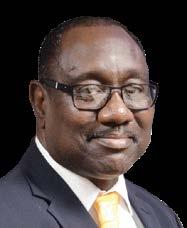
Advocate. As board members, we are the biggest advocates for the district we represent. This includes advocating for our students, teachers, administrators and school systems as a whole. Board members should always advocate for their districts and be one of the top spokespeople for their schools.
Selflessness. We took on the responsibilities of being a board member with the understanding that there is no pay involved. We give our time each month to attend board meetings, board trainings, and many other functions on behalf of our school districts. When decisions are being made, it is not about what we want, but about the needs of the students.
Servant. We are servants to our school districts as well as to the community that elected us. We give up our free
time to attend meetings, trainings and other events on behalf of our schools, and there are times when we even help work some of the events.
Impactful. Our decisions impact the future of our youth, teachers, and our communities as a whole. There are many times when I have been approached by someone who graduated from our school district, and they remembered and thanked me for making an impact on their lives.
Objective. As visionaries for our schools, we must be objective and always do what’s best for the children, even when it comes to the hard decisions. We must remain open-minded because the end results we seek are what’s best for the children we serve.
Nobility. We are held to a higher standard, and we should always think of our school districts in the same manner. We should always expect the best of our schools, and in order to receive the best we must give our best.
For those of us who are veteran board members, let’s share the passion that we have and continue to be the best members that we can be and show it within our communities. Just look at it as the pay that we receive for a job that we enjoy!


A partnership between the Lonoke School District and the Greenway John Deere dealership will prepare Lonoke High School students for agricultural technician jobs that will pay them $40,000-plus a year when they graduate. It’s part of a larger program where students are learning workforce skills with help from community partners. And it’s all the result of a millage campaign led by a patron who became a school board member.
16
Conference: Less news, great info
The 2022 Annual Conference lacked the drama of the previous year’s when ASBA left the NSBA for COSSBA. But sessions covered a lot of important topics, including communications and engagement.
39
School lawyer: Don’t get near FOIA line
When in doubt, notify. That was one of the messages shared by four full-time school attorneys at the ASBA School Law Seminar Feb. 7.


Anyone who’s ever complained about the state of America’s youth has never heard the winners of ASBA’s Student Speaker contest speak at the Annual Conference.
This fairly new tradition is one of the better things ASBA has done. Each year, ASBA gives students across Arkansas a chance to express themselves through a written essay and a recorded speech reviewed by judges. This year’s topic was “Define and discuss challenges you see in our educational system. What changes can be made to improve it for the next generation of learners?”
The winner, Pryce Renfroe, a senior at Russellville High School, received $1,000, while Little Rock Central High junior Ava Walker came in second and received $750. Bryant High School senior Sabian Murray won $500 as the third place winner, while Bigelow High School junior Bennett Wilson placed fourth and received $250.
The top three finishers addressed school board members, administrators and other attendees at the Annual Conference. Their speeches were thoughtful, and their demeanors were poised and confident. If they were nervous, they didn’t show it.
In his speech, Pryce encouraged audience members to put themselves in students’ shoes and ask how schools can give them more of a voice. He noted that students are more inclined to be engaged in things that are important to them, and that they are shaped by the hours they spend consuming media and marketing.
Given those realities, school leaders should empower students to be involved in the decisions that affect their educations. Students need to believe their voice has value. In his school, a student advisory board serves that purpose.
In his conclusion, Pryce encouraged audience members to listen to students and learn what changes they want to see.
Students should see that their input is valuable, and they should be told when their ideas are implemented. Likewise, staff members’ input should be valued, and all stakeholders should know schools will listen to them and strive for excellence.
I’m pretty sure I didn’t know the meaning of the word “stakeholder” when I was a high school senior, but Pryce definitely does. Ava’s and Sabian’s speeches were equally impressive.
I don’t know what those young people are planning to do with their lives, and at their ages they can’t know for certain either. I’m confident they will succeed in whatever they do, and if they choose to be in the public eye, we haven’t seen the last of them.
School board members aren’t involved in their districts’ day-to-day operations. Their leadership comes in other forms, such as community relations.
Public schools are often criticized by adults who have not stepped foot in a school building since they graduated high school. When given a chance to defend schools, leaders can talk about the programs they are implementing, the new digital technology available to students, the fact that students now can earn associate’s degrees and technical certificates while still in high school, and the steps being taken to make schools safe.
In fact, let’s do talk about those things every chance we get. But our best defenses of public education are the young people themselves – students like Pryce, Ava and Sabian. Point to them.
And while we’re at, let’s heed Pryce’s advice and listen to what they have to say. Let students be involved. Listen to them. Implement their ideas. And then tell them when we do that.
That’s because Pryce is right. An engaged and empowered student is a better student.
The Journal of The arkansas school Boards associaTion
Vol. 17, Number 1 March 2023
Board of Directors
President: William Campbell, McGehee
President-elect: Randy Hutchinson, Springdale
Vice President: Jeff Lisenby, Sheridan
Secretary-Treasurer: Doris Parham, Bearden
Past President: Rosa Bowman, Ashdown
Region 1: Travis Warren, Farmington
Region 2: Mitchell Archer, Bergman
Region 3: Joe Sheppard, Jonesboro
Region 4: Craig Frost, Clarksville
Region 5: Clint Hull, Pottsville
Region 6: Nikki King, Pangburn
Region 7: Kristain Dedmon, Osceola
Region 8: Jereme Carter, Carlisle
Region 9: Donna Dunlap, Barton-Lexa
Region 10: Mark Curry, Lake Hamilton
Region 11: Carl “Buddy” Puckett, Poyen
Region 12: Laura Clark, Blevins
Region 13: Open
Region 14: Jerry Daniels, Warren
Staff
Executive Director: Dr. Tony Prothro
Board Development Director: Tammie Reitenger
Governmental Relations Director: Dan Jordan
Finance Director: Diana Woodward
Communications and Technology Director: Sherri Fite
Staff Attorney: Kristen Garner
Policy Director: Lucas Harder
Database Administrator: Kathy Ivy
Commercial Affiliates/Board Liaison Manager: Angela Ellis
Bookkeeper: Kayla Orr
TIPS-TAPS Project Manager: Stacey McPherson
General Counsel: Jay Bequette
Risk Management Program & Workers’ Comp. Program:
Shannon Moore, Director
Krista Glover
Dwayne McAnally
Misty Thompson
Melody Tipton
Linda Collins
Lisa Wigginton
Kara Quinton
Julianne Dobson
TO CONTACT THE MAGAZINE
Please contact Steve Brawner, Editor 501.847.7743; brawnersteve@mac.com
Report Card is published quarterly by the Arkansas School Boards Association. Copyright 2022 by the Arkansas School Boards Association and Steve Brawner Communications. All rights reserved.



William Campbell, a 30year McGehee School Board member and ASBA’s president, was named a board member of the Consortium of State School Boards Associations, otherwise known as COSSBA, in January.
Plans are taking shape for the Southern Region Leadership Conference at the Hot Springs Convention Center on July 16-18.
The conference brings together school board members from Arkansas, Louisiana and Mississippi on a rotating, three-year basis. Arkansas’ scheduled hosting in 2020 was cancelled because of the COVID-19 pandemic.
Campbell
Campbell had earlier served as a member of the interim board of directors for the organization, which was founded in the spring of 2022 by state school board associations who had left the National School Boards Association be-
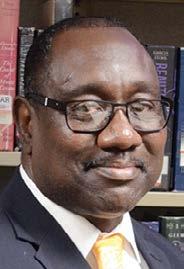
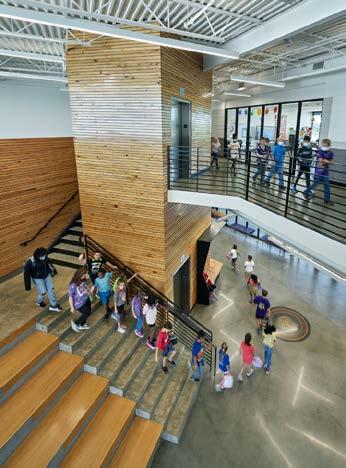
cause of concerns over the governance, communications, fiscal solidarity and value of membership with NSBA. It is now composed of 23 state school board associations.
Campbell said the board will meet quarterly. It met in Savannah, Georgia, in January, and was scheduled to meet again at COSSBA’s inaugural annual conference March 31 to April 2. The COSSBA board is composed of 18 voting members, including eight board members from member states’ boards of directors and four executive directors of member states.
It also has one non-voting exofficio official, the consortium’s newly hired executive director, Thomas Bertrand.
Bertrand is the executive director of the Illinois Association of School Boards. He will assume his new role on July 1, 2023.
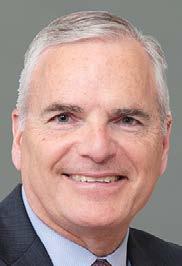
The keynote speaker will be Sam Glenn, a motivational speaker and author of more than 30 books who at one time was homeless and sleeping in his 1982 Buick Regal. His life changed as a result of a chance encounter at a buffet with motivational speaker Zig Ziglar. Glenn has spoken before crowds as large as 75,000.

ASBA Board Development Director Tammie Reitenger said, “I am excited to bring a speaker to recharge, rekindle and inspire new levels of optimism, purpose, engagement, resilience, and teamwork!”
More information about the conference, including the agenda and how to register, will be available on ASBA’s website, www.arsba.org.
The annual Joint Leadership Conference bringing together ASBA and the Arkansas Association of Educational Administrators will be May 2 at the Wyndham Riverfront in North Little Rock.
Leaders from ASBA and the AAEA will provide an overview of education-

STUDENT SPEAKERS. Pryce Renfroe, a senior at Russellville High School, left, was the winner of ASBA’s annual student speaker contest. Each student submitted a personal essay and a video of that essay presented as a speech. The topic was “Define and discuss challenges you see in our educational system. What changes can be made to improve it for the next generation of learners?” The top three winners spoke at the Annual Conference. Renfroe won a $1,000 award. The second place winner was Ava Walker, center, a junior at Little Rock Central High School, who received a $750 award. Sabian Murray, right, a senior at Bryant High School, placed third and received $500. The fourth place winner was Bennett Wilson, a junior at Bigelow High School, who received $250.

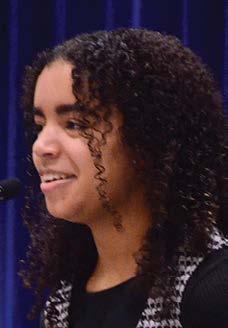

related bills considered in this year’s legislative session, including Gov. Sarah Huckabee Sanders’ education overhaul.
More details about the agenda and about how to sign up will be available at ASBA’s website, www.arsba.org.
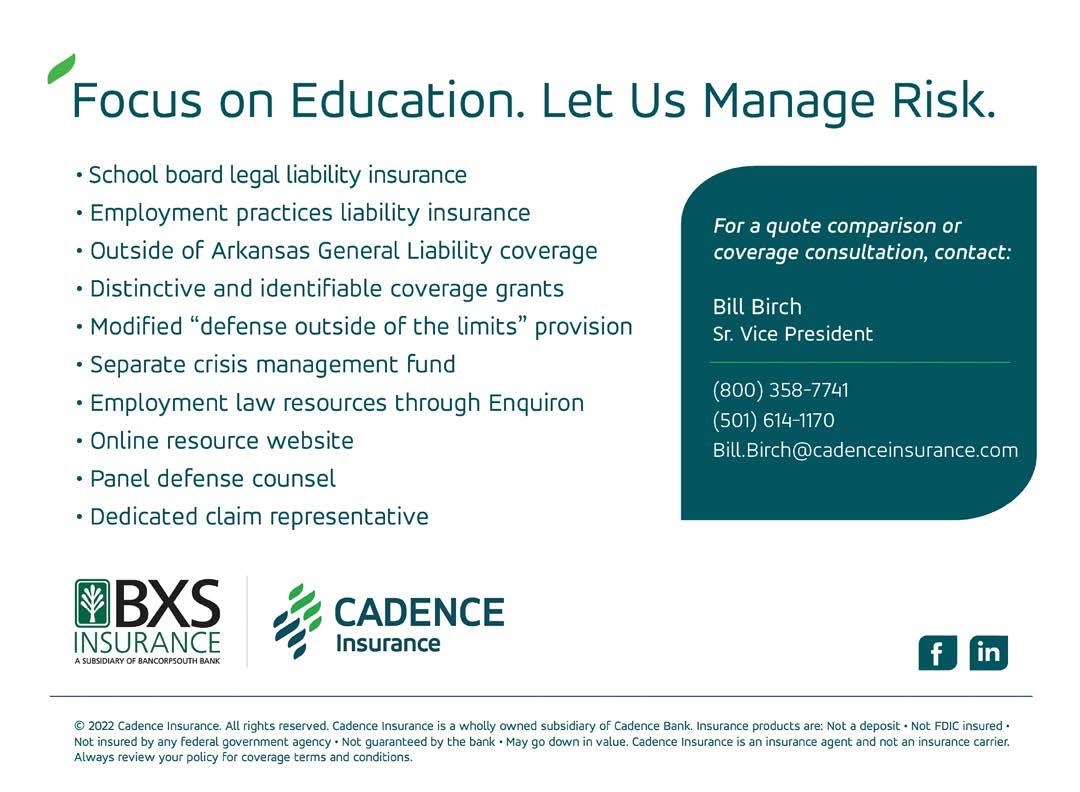

The Lonoke Business Academy is partnering with the Greenway John Deere dealership to prepare students directly for the company’s technician jobs. Other partnerships are helping students get ready to work as diesel mechanics, in agriculture, and as rural health care workers.
By Mattie Brawner Contributing writerA partnership between the Lonoke School District and the Greenway John Deere dealership will prepare Lonoke High School students for agricultural technician jobs that will pay them $40,000-plus a year when they graduate. It’s part of a larger program where students are learning workforce skills with help from community partners. And it’s all the result of a millage campaign led by a patron who became a school board member.
Family-owned Greenway, which operates 27 dealerships in Arkansas and five in southeastern Missouri, is investing $1.5 million in the program, while the Arkansas Office of Skills Development provided a $1.2 million grant. The state grant was announced by Gov. Sarah Sanders at the Lonoke Business Academy – Carver Campus Feb. 3.
Students will spend 2.5 hours a day in the classes and will earn air-conditioning, computer diagnostics, hydraulics and electrical certifications. They’ll train on tractors and harvesting systems including combines, hay bailers and cotton pickers. Greenway’s investment will pay for equipment, tools and the instructor. It designed the curriculum.
Jared Field, Greenway training manager, said in an interview that the certification process for adult trainees normally lasts about two years. Lonoke students will undergo most of that training during their junior and senior years.
Once they graduate, they’ll train another three months and become John Deerecertified technicians. Then they’ll be ready for jobs that start at $40,000 plus monthly performance bonuses. Salaries can increase significantly within a year or two.
Field said the company created the program to benefit the community and to bolster its own workforce.
“Any given moment, we’re looking for at least 30 service technicians, and so there’s always space within our shops,” he said. “For kids that are not interested in going to post-secondary education, this is an opportunity to grab them while they’re in high school, get them up to speed educated to where they can roll out and immediately be as effective as one of our service technicians who’s been with us for several years.”
Superintendent Jeff Senn said Lonoke is the first school in Arkansas to be affiliated with John Deere and one of only
two in the country. He said the district wanted to work with a local employer and wanted to provide opportunities and direction for its students.
The two-year program will start this fall and be limited to 24 students who will undergo an application and interview process with Greenway before being accepted. Students must be on course to graduate. The company wanted to limit the classes to 24 students, half in the morning and half in the afternoon, so they can receive more hands-on instruction. Field said students will be trained on up-to-date technology.
“Autonomy is coming real soon in John Deere tractors,” he said. “Those tractors are out there. They’re floating around right now. So we’ll bring some of that latest and greatest. As it filters into our area, we’ll bring autonomy into these shops so that they can see autonomous tractors.”
Field said students who discover they don’t want to be service technicians will
gain skills they can use elsewhere in the company, such as in the parts department. Classes their senior year will cover John Deere communications and computer processes. They also can find employment working for other companies in the agriculture or diesel mechanic fields if they decide not to work for Greenway.
The $1.2 million state grant will pay for tools and equipment requested by Greenway. Gov. Sanders said the program is unique now but can be replicated elsewhere.
“I spent about two years on the campaign traveling all over the state,” she said. “Every single corner that I went to, every region, every business leader I met with, everybody had the same problem: They could not find skilled, qualified workers fast enough, and so what is happening here today is changing the game, changing the dynamic of what really building a skilled, qualified workforce looks like.”


The program will be housed in the 30,000-square-foot Lonoke Business Academy – Carver Campus. The building houses classes on agriculture and aquaculture, diesel mechanics, industrial technology, and health professions.


To receive funding from the Arkansas Office of Skills Department, districts must have a partnership, such as with a local university. For agriculture classes, Lonoke partnered with Arkansas State University – Beebe. Five of the six instructors are ASU employees, and one is a Lonoke High School employee. Through the diesel mechanics program, students can earn concurrent credit hours with ASU – Beebe. Senn said 50-60 students are involved in those classes now. The Greenway program differs from that program in that it does not offer concurrent credit and has an agriculture focus. Field said Greenway decided to work with Lonoke after the

school district approached the company. The district already had built the facility and had done the heavy lifting.
Senn said about 30%-35% of Lonoke graduates attend college, and that schools have been too focused on academia and not enough on students entering the workforce. At the grant announcement, he told attendees that about six years ago when he worked at another district, he took his car to a repair shop and saw that a recently graduated student would be working on it. When Senn asked him how he had learned to fix cars, the young man replied “YouTube.”
That bothered him.
“I thought how much I had failed him trying to make him do history and science and all these other things and prepare him for post-secondary ed, and I didn’t do anything to help him for the job that he had taken,” he said. He added half-jokingly that “[He] was going to work on my car, and I didn’t know that I trusted him at that point.”
It’s called the Lonoke Business Academy – Carver Campus after a discussion with alumni of the George Washington Carver Black School, which was once located behind where the business academy now stands. They had been told a school eventually would be named after their school, which had been dismantled after integration. Part of the educational building is sectioned off with two rooms accessible to the community after school hours but with no access to classrooms. It contains the George Washington Carver Multicultural Room and the Chris James Auditorium. James was a beloved former school board member who died of cancer in 2013.
The academy was built after the district passed a 2.5-mill increase in March 2020 that was spearheaded by future school board member Elizabeth Anderson and her husband, Jamie.

The two were approached by thenSuperintendent Dr. John Tackett with the idea to start a business school on campus. In 2019, after being denied state funds, they realized it would require a millage increase, which they knew would be hard to pass.
“We are the highest millage rate pretty much in our co-op, so it was really hard to pass a millage. … But we’re just thankful our community got behind it and passed it,” Anderson said. “I
remember [we told them] it was a cup of coffee a day.”
The milage passed with 67% support on March 3, 2020, just two weeks before schools shut down for COVID. It
increased the millage rate from 43 mills to 45.5 mills, which raised $12 million. The new 30,000-square-foot building was completed in 2021, and the number of students enrolled has already more than doubled this year.

Anderson took it upon herself to run the campaign.
“Basically I went to every community event,” she said. “I went to Sunday school classes; I went to churches; I went to Chamber meetings and Lions’ Club and Century League Clubs and any type of group organization I could attend. I attended political events because it was during the elections just to be able to meet with people and explain to them the importance of educating our kids and preparing them for the workforce here, that’s available here.”
One of the biggest challenges was getting local farmers on board. Most own large amounts of land and assumed their taxes would increase significantly. But farmland is taxed differently than
personal property is. Anderson is a bank executive with Farmers Bank and Trust, while Jamie has a farm in Lonoke County, so the Andersons could speak their language.
“I’d have a farmer saying ‘I don’t want my taxes [raised],’’ she said. “I’d pull his public record, calculate it for him and send it to him or go knock on his door and say, ‘I just wanted to let you know, it’s only going to cost you about $250 a year, plus you’re providing agriculture students to be a part of the community.’ So, once you explained that and sold it to them, it was an easy sell.”
Anderson and her husband both were public school educated. She graduated from Magnolia, while he graduated from Lonoke.
“So, it was really important for us, if we were going to continue to send our kids to public schools, that we provide those platforms and educational opportunities for all kids, not just our own.” Anderson said.
After the millage passed, Anderson was appointed to the school board in 2021 and elected last year.
The millage increase paid for the building but not the equipment inside of it. Anderson said she called everyone from the Arkansas Trucking Association to Baptist Health to raise money. Many of the items in the school were then donated, or the money was donated to buy them. The school was stocked with tractors, drones donated by Bayer, and a $500,000 diesel simulator thanks to a grant from Cummins. A diesel truck with only 4,000 miles on the odometer was donated. Anderson said one of the district’s biggest challenges is making sure the students are working with current technology, which means the district says “no” to old, obsolete trucks and tractors.
Anderson said that as a banker and not a mechanic, she didn’t really know what equipment was needed. To fill in
the gaps, she relied on Ken Calhoun, board chair for the Office of Skills Development and a trucking industry executive.
“He’s kind of my secret weapon,” she said, “because I’m a banker by trade, so I don’t know anything about diesel technology or the equipment needed or even what is obsolete and what’s not. ... He will call me and say ‘What do you think about this?’ and I’ll say ‘That sounds great’ and he’ll apply for the grants. He’ll send me the information, we’ll read through it together, and then he will actually get it.”
The school also offers agriculture and aquaculture studies. The program teaches welding, crop planning, drone controls, hydroponics, and animal husbandry. Students must come feed the animals and maintain their pens, even on weekends and breaks.

“When you have animal science, one cool thing about it is your school, instead of being nine months, it becomes year round,” Anderson said. “Because even during Christmas the students have to learn the responsibility of who’s taking care of the animals. Just like any other job, it kind of creates some responsibility.”
Aquaculture is a huge industry in Lonoke County, so the classes meet a critical workforce need. The aquaponics lab will house several species of fish when it opens in March and is connected to the greenhouse. Aquaculture students will meet with Anderson’s husband, Jamie, at his fish farm, I.F. Anderson Farms, to learn about his business. Anderson said she sees his struggles to find workers for his business.
The school leases an on-site medical building to Baptist Health Family Clinic that houses both a community clinic and a clinic for the students to learn nursing skills. The district partnered with Baptist Health – University of Arkansas for Medical Sciences Medical Education Program and ASU – Beebe to create the curriculum. Lonoke’s one medical doctor, Dr. Les Anderson, moved his office into the clinic. Students taking medical classes can shadow the clinic’s medical professionals. They can graduate from

Lonoke High School as certified nursing assistants and fast track through ASU –Beebe’s LPN program. The lab includes a mini-pharmacy, and the students learn how to use IVs.
Anderson said the medical school is preparing students to work in a rural environment. Rural healthcare is different than urban healthcare in that providers must know every aspect of care, she said.
“We have one doctor in Lonoke, and he will tell you that somebody might walk in today that’s eight months pregnant that doesn’t know they’re eight months pregnant,” she said. “Tomorrow it may be somebody who just walked in to see the doctor and they’re having a massive heart attack, whereas in urban areas they typically go straight to the ER for those types of things. As you get more rural, the doctor is the closest thing.”
One of the benefits of having the onsite medical clinic is that in addition to


providing training for the students, the Baptist Health – UAMS program sends up to five residents each day to train in rural healthcare.
“Through this program, we now have a pediatrician that sits on the sidelines of our football games, which is really a great asset to have,” Anderson said. “You go to a volleyball game, and there’ll be a resident doctor sitting there, and lot of smaller school districts just don’t have that type of asset.”
There are practical, everyday benefits to the program. One day, Anderson received a phone call at work alerting her that her son had possibly broken his thumb at football practice. By the time she arrived at the school from Little Rock, he had already seen the doctor, had an x-ray, and learned that his thumb was only sprained.
All of this has been made possible by the school district’s partnerships – with the state, with Greenway, with medical providers and others. The district isn’t
stopping there. It hosts a business education meeting twice a year in which it invites local business owners and CEOs to discuss how the school district could prepare students to be able to work for them.

“I’m a huge proponent when it comes to public education that you have to have your community engaged, because you know your public schools filter into your local economy; they’re providing the workforce for your local economy,” Senn said. “So, if you’re not training these kids to actually go into the workforce that your community provides, then you’re doing a disservice to the students and to your community.
“They’re the taxpayers. They’re the ones that fund the schools, and so it only makes sense that you train these kids in preparation for jobs that are available for here. Otherwise, they’re going to pack up and move and go somewhere else, so you’re not creating economic development.”
The 2022 Annual Conference lacked the drama of the previous year’s when ASBA left the NSBA for COSSBA. But sessions covered a lot of important topics, including communications and engagement.
The 2022 Annual Conference was less newsworthy than last year’s, and that’s a good thing.
The conference had 721 attendees, which was enough to force a late shift from upstairs at the Statehouse Convention Center to a larger downstairs area. The Delegate Assembly featured the usual highlights from the past year. One hundred percent of Arkansas school districts are members of ASBA, one of the few state associations able to make that claim. ASBA’s Worker’s Compensation Program has 256 members, including all districts, while 252 members, including every district, are enrolled in ASBA’s
Model Policy Service. The Errors and Admissions Program has 212 members. The Risk Management Program increased to 179.
The positive but rather uneventful report came at the beginning of the Delegate Assembly, where members unanimously cast their votes.
It contrasted with the 2021 Delegate Assembly, when attendees voted to join other states in leaving the National School Boards Association because of concerns over its governance, communications, fiscal solidarity and value of membership, and instead move to the newly formed Consortium of State School Boards Association. That particular vote was almost unanimous and much more momentous.

As in every Annual Conference, outstanding school board members were honored, including 40-year veterans Curley Jackson of Drew Central, Clint
Hull of Pottsville, and Max Ray Shrable of Viola. Watson Chapel School Board member Sandra Boone was honored with ASBA’s Dr. Daniel L. Pilkinton Award after spending 32 years as an educator and 20 years as a school board member. A special recognition was given to Carolyn McFatridge in remembrance of her husband, Mickey, a longtime educator and ASBA staff member who died last year. Dr. Tony Prothro, ASBA executive director, said Mickey was “a man of character, a man of integrity.” Even though Carolyn was not an ASBA employee, she was often at his side.
“These two people are the epitome of what a spousal relationship should look like,” Prothro said.
A common subject among the breakout sessions was communication and engagement. In one early bird session, Beebe Superintendent Dr. Chris Nail,
School Board President Jason Smith, and Jessica Prothro, assistant director – communications and instructional technology, described communications

between the superintendent, school board, staff and community. The three said transparency builds trust, that everyone being on the same page helps the district achieve its goals, and that the district must tell its story because otherwise someone else will.


Communications at Beebe District-board communications are a high priority at Beebe. If anything, Nail tries to over-communicate with board members. Every Friday at 7 a.m., the district sends out a board memo that describes issues administrators are dealing with, including Freedom of Information Act requests. The memo keeps board members informed in case they are approached in the community. Nail contacts board members whenever they are likely to get calls from patrons. When a bus overturned with no students inside, he quickly texted his board members. Smith said it saved Nail the time he would have spent responding to
school board members’ questions. When three new board members were elected after a contentious election, the district had a full-day onboarding session with all five members with help from ASBA and a district team. It helped the new board members better understand their roles before their first meeting, which went smoothly.
The district takes particular pride in its board packet preparation process. The day after a board meeting, Nail starts forming the next meeting’s packet. He tries to consider what is the easiest way for board members to digest information. Every recommendation must have a rationale. He wants to ensure board members have seven days to look at their packet. It’s posted online complete with the agenda, superintendent’s comments and hyperlinks. Jessica Prothro said preparation for the board meeting lasts all day. Everything is set up so the meeting doesn’t feel rushed.
Continued on page 21

BOARDS OF EXCELLENCE. North Little Rock, left, and Cross County received ASBA’s School Board of Excellence Awards at the Annual Conference. Recipients must have documented evidence in eight criteria: supporting student achievement; supporting educational improvement projects; commitment to a code of ethics; maintaining harmonious and supportive relationships among board members and the superintendent; adhering to adopted policies; overseeing district finances consistent with the district’s strategic plan and policies; participating in improvement programs; and supporting public relations and community awareness efforts. Left photo, pictured from North Little Rock from left are Dr. Greg Pilewski, superintendent, and board members Valerie McLean, Cindy Temple, Dorothy Wiliams, Natalie Wankum, and Dr. Rochelle Redus. Not pictured are Angela Person-West and Tracy Steele. Right photo, pictured from Cross County from left are Superintendent Nathan Morris and school board members Dewayne Cameron, Shane Bell and Derek Wood. Not pictured are Ashley Armstrong, Joan Ball, Wade Halk and Craig Walker. Photos by Lifetouch.






MASTER BOARD WINNERS. Five boards received Master Board awards after all of their members achieved at least 50 hours of professional development. Top left photo are Yellville Summitt School Board members, from left, Nathan Rogers, Travis Doshier, Jason Jones, Robin Lee and Eleanor Davenport. Top right photo is the Osceola School Board. Pictured from left are Ollie Collins, Denise Williams, Kristain Dedmon, Torian Bell and Kristie Hopper. Not pictured are James Baker and Jacqueline Baker. Above left photo, Fayetteville School Board member Nika Waitsman stands with ASBA Executive Director Dr. Tony Prothro, left, and ASBA President William Campbell. Not pictured are board members Justin Eichmann, Tim Hudson, Katrina Osborne, Tracey Pomeroy, Keaton Smith and Megan Tullock. Middle photo, Decatur School Board member Ike Owens stands with Campbell. Not pictured are board members Kevin Smith, Amy Brooks, Karen Davis and Darleen Holly. Right photo, Clarksville School Board member Craig Frost poses with Campbell. Other members of the board are Clay Austin, Bobby Freeman, Joanie Liles, and Jamie Payne. Photos by Lifetouch.

Communication with staff is also important. A board meeting review is sent to staff and media at 9 a.m. the day after the meeting so staff members know exactly what happened.
Smith said it’s worth the effort.
“You know that not one thing goes on in a school district without what? A board meeting,” he said. “Not one thing happens at a school district. Kids don’t get fed. They don’t get delivered to school. You don’t have a superintendent. You don’t have teacher contracts. You don’t have anything until you have a board meeting. The board meeting is the foundation of every school district in this room. And I’ll be honest with you, I don’t care if we have three people fulltime working on the board packet for an entire month. I would do that to get the production and the efficiency that we get out of the way they handle the board meetings.”
Likewise, the board must communicate with the superintendent. Smith said
he and Nail talk at least once a day, and not always about school business. He warned that the talent pool of available superintendents is shallow, so board members should try to keep a good one if they have one.
The three also discussed communicating with the community. Prothro said the district must try to control the narrative and drive out the negative with the positive. Sharing the truth helps stop the spread of misinformation. Nail said districts must consider how community members want to be communicated with. His community members want a text message sent to their phone with an active link, and they don’t want videos longer than three minutes. Facebook, Instagram and Twitter can reach people in the district and be measured. Prothro advised schools to be as transparent as possible and be responsive on Facebook, but if a user is hostile, don’t engage with them. Smith said he often encourages community members to use the chain of
command. Board members feel a burden to help everyone that calls them, but that’s not their role. An effective explanation he often uses is, “That’s not really what we do.”
Engaging families and communities was the subject of a breakout session led by Chelsey Moore, coordinator of engagement with the Division of Elementary and Secondary Education, and Freddie Scott, operations manager.
The two explained that engagement is required by both state and federal laws and by State Board of Education rules. By Arkansas law, every school district must have a school engagement facilitator who helps organize meaningful training for staff and parents, promotes and encourages a welcoming atmosphere, and tries to ensure parental participation is recognized as an asset. Each Aug. 1, each district is required to submit to the state a written family and community engagement plan. Schools
Continued on page 22

Access control means securing the perimeter of the school’s property, including each point of entry. An Access Control Manager (ACM) is a physical access control system designed to protect students, faculty, and guests.

EMERGENCY LOCKDOWNS
Have a plan before an active shooter situation or other emergency occurs.
AUTOMATED DOOR PLANS
Customize which doors lock or remain open as well as customize which personnel have access to open doors.
ACC connects your access control and video security.


Since the early 1930’s, Stephens has offered broad-based knowledge and sound advice with the objective of meeting the long term financing goals of Arkansas public schools. We are proud to support our partner, Economics Arkansas, who trains PreK-12 teachers how to incorporate principles of economics and personal finance into the classroom curriculum. Economic education is real life because all young people will grow up and become part of the marketplace. Through training teachers, the multiplier effect is achieved every school year and impacts the lives of new children.

Utilizing the iNSPIRE program based on the series, This is Capitalism, produced by Stephens, teachers are trained by Economics Arkansas with a classroom curriculum for teaching children the value of the free enterprise system. Young people grow and learn the responsibilities of financial literacy and economics that will benefit them all of their lives. For more information, visit www.thisiscapitalism.com and www.economicsarkansas.org
Attention Educators:
As part of our commitment to ensuring that all children in Arkansas understand the importance and contribution of our free enterprise system, Stephens partnered with Economics Arkansas to develop lesson plans to accompany our “This Is Capitalism” film series. For more information, contact Marsha Masters marsha@economicsarkansas.org
are also required to complete a plan. Any district that receives more than $500,000 in Title I funds, which is about half the state’s districts, is required to set aside 1% for family and community engagement. Districts and schools are required to jointly develop expectations and objectives and have plans for building staff and parent capacity. Moore said the Mountain Pine School District has events for families tied to the curriculum and themed to coincide with the calendar. Those include a “Most Mathematical Time of the Year” event in winter and a “Super Science Spring Fling.” Districts must coordinate their efforts and ensure an engagement infrastructure is in place. Districts must also evaluate their efforts and spend accordingly.







In another session, attendees learned how to communicate with another important constituency – new teachers. The session was led by El Dorado Superintendent Jim Tucker and Stephanie Lowery, the district’s Teacher Induction Program leader. Lowery had come to the teaching profession at age 39 after previously training employees at restaurants.
She saw the new position as an opportunity to do both.
The district has 89 new teachers in the three-year program supported by 52 mentors, 39 of them being a current teacher. New teachers and mentors meet once a week for at least 40 minutes, with a time log filled out and notes detailing
what additional resources might be needed. They meet less in years two and three. Lowery said that training the mentors has been an important part, because teaching adults is harder than teaching students.
The district had a mix of 50% traditionally educated teachers and 50%
 LONGTIME BOARD MEMBERS. Curley Jackson of the Drew Central School Board, left, was honored with ASBA’s 40 Year Service Award at the Annual Conference Dec. 8. Not pictured are 40 Year winners Clint Hull of Pottsville and Max Ray Shrable of Viola. Middle picture, 30 Year Service Award winners included William Campbell, McGehee, top left, Johnny Lockley, DeWitt, and Dorothy Henderson, Ashdown. Other 30 Year winners included Doris Parham, Bearden, inset; Jeffrey Richardson, Marion, top right photo, and Barbara Wells, Blytheville, bottom right. Wells also received the President’s Award for attaining 500 professional development hours. Not pictured are 30 Year Service Award winners Guy Smith of Salem and Karen Daugherity of West Fork. Photos by Lifetouch.
LONGTIME BOARD MEMBERS. Curley Jackson of the Drew Central School Board, left, was honored with ASBA’s 40 Year Service Award at the Annual Conference Dec. 8. Not pictured are 40 Year winners Clint Hull of Pottsville and Max Ray Shrable of Viola. Middle picture, 30 Year Service Award winners included William Campbell, McGehee, top left, Johnny Lockley, DeWitt, and Dorothy Henderson, Ashdown. Other 30 Year winners included Doris Parham, Bearden, inset; Jeffrey Richardson, Marion, top right photo, and Barbara Wells, Blytheville, bottom right. Wells also received the President’s Award for attaining 500 professional development hours. Not pictured are 30 Year Service Award winners Guy Smith of Salem and Karen Daugherity of West Fork. Photos by Lifetouch.
nontraditional teachers, so it designed its program to work with both. The program focuses not just on coaching for support but also coaching for development. Last year, the district had its first three-day teacher workshops prior to the school year’s beginning. The team considered what it would be like to be a new teacher and what everyday concerns they may have, such as where to park. They wanted the new teachers’ first experience with the district to be intentional, they wanted to create a welcoming climate, they wanted to introduce them to the Teacher Excellence Support System, and they wanted workshops to model best practices for teaching. Surveys of new teachers taken a couple
of weeks into the school year found they succeeded in creating a welcoming, positive atmosphere. The program also does “just in time” workshops coinciding with school events and requirements, rather than unloading everything on the new teachers at the beginning of the year.
Mentor teachers are paid $275 per new teacher per semester if they get a release period and $425 per semester per teacher if they work on their own time. For the mentors, it was not just about the money.
“They remembered what it was like to be a new teacher, and they’re also wanting less turnover in their department,” Lowery said. “They just wanted

to help keep teachers here. One teacher said, ‘I hate to make friends and lose them in just a couple of years,’ so that was her motivation.”

Lowery said connecting teachers to the community was a critical part of the program. Teachers not from the area would go home every weekend and end up staying with the district only a couple of years. To combat that tendency, Lowery asked the community to adopt new teachers by sending them notes, gift cards and goodies. One mentor obtained teacher discounts and incentives from local businesses. The local hospital fed all the teachers at the beginning of the year. The Arts Center gave the Continued on next page



“Client satisfaction and strong relationships are not just things we say, our company’s success is founded on it. Partner with us on your next project and we’ll see it through to successful completion!”
 PINNACLE WINNERS. Eight Arkansas school board members were awarded the Pinnacle Award at the ASBA Annual Conference for attaining 200 hours of professional development. They included, from left, Denise Williams, Osceola; Larry Reynolds, Woodlawn; Renee Skinner, El Dorado; and Bill Fair, Blytheville. Not pictured are Dana Greeson, Fountain Lake; Jim Moore, Jacksonville North Pulaski; Carman Young, Van Buren; and Tammye Sherrill, Waldron. Photos by Lifetouch.
PINNACLE WINNERS. Eight Arkansas school board members were awarded the Pinnacle Award at the ASBA Annual Conference for attaining 200 hours of professional development. They included, from left, Denise Williams, Osceola; Larry Reynolds, Woodlawn; Renee Skinner, El Dorado; and Bill Fair, Blytheville. Not pictured are Dana Greeson, Fountain Lake; Jim Moore, Jacksonville North Pulaski; Carman Young, Van Buren; and Tammye Sherrill, Waldron. Photos by Lifetouch.






EXHIBITORS. Top left, Brock Cline with Nabholz visits with Greg Coats with the Hoxie School Board. Second row left, Danny-Joe Crofford with All-Clean speaks with a conference-goer. Second row right, John Coleman with Entegrity visits with Keaton Smith with the Fayetteville School Board. Third row left, Michael Johnson with Architecture Plus visits with a conference attendee. Third row right, John Langham, left, Russell Fason and Kate Dimitrova, background, with WER Architects/Planners man the booth while Elaine Sullivan with the South Conway County School Board makes the rounds. Bottom left, Stacey McPherson with TIPS, left, visits with a conference-goer. Bottom right, Steve Anderson with Strategos International visits with Valley Springs Superintendent Kyle Mallett.
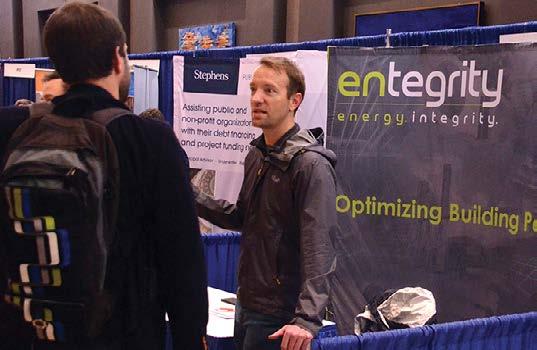
new teachers a free membership and free tickets to one of its performances. Churches fed teachers during workshops.
With schools becoming increasingly desperate to find teachers and millennials becoming the dominant generation in the workforce, what can school districts do to attract them to the profession? They can start by understanding them, said Tyler Tarver, a former teacher and principal who now operates Tarver Academy, an online school resource company.

In an early bird session, Tarver said millennials, classified as Americans born between 1981 and 1996, are the workforce’s most independent generation. Studies have shown they are concerned about their workplace’s ethical and social responsibility, with the following Generation Z, born from 1997 to 2012, even more so. Millennials are likely to push for change in the workforce. They need to feel like they are part of a community and a part of a worthwhile endeavor. They need to be heard and trusted. They tend to want to work fewer

hours, and they’re impatient with their career goals. They need a clear advancement plan and an opportunity to participate in activities that promote personal growth. Administrators should ask them where they want to be in five years, and then help them start to get there.
“If we’re not something people either feel purpose to work for or enjoy working for, they’re going to go somewhere else, because they have options,” he said.
Tarver said school districts need a good internet presence to attract millennials. They should post often and tell their positive story. More people, after all, will see their website than their school building. Schools’ social media efforts reflect what they care about. A site that brags about the district’s teachers demonstrates to a potential recruit that the district values them.

Millennials are annoyed by inefficiency and don’t like their time to
Continued on page 27






MORE EXHIBITORS. Top left, Michael McBryde with Stephens visits with Brookland School Board member Brandon Sutton. Second row left, Chris Lankford, right, with Modus Studio talks with Al Larson with the Eureka Springs School Board. Second row right, Jean Mouton, left, and brother Alex Mouton describe Mouton 3 Services to a conference attendee. Third row left, Bill Birch with Cadence Insurance visits with Danny Samples, Palestine-Wheatley superintendent, while ASBA’s Shannon Moore looks on. Third row right, Becky Gosnell, left, and Leigh Anne Showalter with C.R. Crawford visit with Jordan Price, Ozark assistant superintendent and athletic director. Bottom left, Steven Greathouse and Bri Davis with Arkansas Public Safety Solutions visit with two conference goers. Bottom right, Drew Williams with Baldwin & Shell visits with Searcy County School Board member Talitha Hardin with Jacob Spears, left, and Cody Yeoman in the background.

be wasted, so schools should avoid unproductive routine meetings. School districts must ask if activities are necessary and if they are making the district better. If the answer is no to both, those activities should be dropped. Otherwise, they should be made more efficient. He said schools should let millennials wear jeans, because certain battles aren’t worth fighting and sometimes little things can go a long way.

“Let’s listen to them, figure out if anything they’re saying is a good point or a good idea, and then apply it when we can,” he said.


Members of Generation Z, meanwhile, are ambitious, sensitive and vocal. Like millennials, they expect companies to reflect their values. They’re multitaskers, they expect a seat at the table, they’re ambitious and entrepreneurial, and they don’t particularly value experience. They have short attention spans but pick up on new developments quickly. They won’t show respect unless
it’s shown to them. Tarver said schools must reconsider what they are teaching a generation that can find anything on the internet. Instead of emphasizing the ability to memorize, educators should develop students who can interpret a website.


In another breakout session, Brookland security officials described how they created a command center where every part of the district can be monitored. Doug Formon, director of security, said the district started with an empty room in July and now has a command center with 10 TVs tied to 140 active cameras. It was constructed relatively cheaply. Formon said each 65-inch TV cost $228 for the district to buy, and a school can get these donated by members of the community.
“This is a very, very simple thing to put together. If you have an empty room somewhere, this can happen,” he said.


EAST lab students are mapping the entire campus in 3-D. If the security
team has to send a school resource officer to a location, the incident could be pulled up on a map, with the information shared with responding agencies. Students who work in the operations center will give security personnel a heads-up about an expected fight planned for a particular location. Security personnel can keep an eye on that area via camera and can head off the fights when they see students gathering. The number of physical altercations in the junior high and high schools has dropped because personnel can stop them before they happen. Jeff Pressley, school safety coordinator, was watching the stands via camera during a football game and noticed a man was having a seizure, so he called the ambulance.



In the general session Thursday, Dr. Phil Gore, a former Seattle school board member who now is director of board services with the Vermont School Boards Association, tied school board
Continued on next page
service to his mountain-climbing experiences. Mountain climbing taught him about discipline, vision, focus and completing things. He said he didn’t graduate from college until he was 36 years old even though he had attained fiveand-a-half years of college credit. He climbed his first mountain, Mt. Rainier, at age 39. It took him a year and a half to get in shape. He had to figure out what he needed while knowing he didn’t have unlimited resources, so he had to operate within a budget. On the climb up, he and his partner got caught in a blizzard, so they used what they had to survive. Believing they would die if they went to sleep, they stayed awake by consuming hot tea and chocolate espresso beans. Indeed, two other men died that day. After that experience, he knew he had to try to climb the mountain again soon, so he went with a guide service. It took courage, persistence and openmindedness. He was a conservative pastor, while one of his fellow climbers was a San Francisco liberal, but they climbed the mountain together because they all remained fixed on a single goal.
The same is true for school boards.
“When the main thing stays the main thing, you can do it,” he said. “When the main thing is about children and their success and their future, people from all walks of life can effectively serve on a school board and make a difference for each and every child. But if you got on
a school board because of one issue, one agenda, you need to either get over it or get off. If you got on a board recently because of whether to mask or not mask, what are you going to do now?”
Gore said whether climbing a mountain or serving on a school board, individuals are roped together with people they may not know well and may not like. In a rope team, one person can misstep and take down the whole team. The same can happen on a school board if one person makes the wrong step. Gore said mountain climbing taught him to communicate, have vision, adapt, and have courage. The collective wisdom of the group matters. Focus and goals are important.

“Your students need you to have clear and specific goals for where you’re going,” he said. “If you’re not sure, head that direction and figure it out as you go. You know the direction you need to go: Get more kids’ reading comprehension at grade level for every grade. So don’t worry about all the excuses for why you wouldn’t set a third grade reading comprehension goal because of the eighth graders and third graders and the science class and art teacher. All that’s just noise. Figure out with your board where you want to go and head that direction, and the closer you get to your goal, the more clear the goal will become.”
In a Friday morning session, thenSecretary of Education Johnny Key
told attendees that the purpose of the country’s school system is academic outcomes for students.
He said he had attended along with ASBA’s Dr. Tony Prothro a training about effective school board governance provided by the Education Commission of the States and the Council of Chief State School Officers. A message often repeated there was, “Student outcomes do not change until adult behavior changes.” He listed examples of both in Arkansas. The state’s number of certified computer science teachers increased from fewer than 50 in 2015 to nearly 800 now, while the number of students enrolled in the classes increased from roughly 500 to almost 24,000. He said he was asked about Arkansas’ computer science achievement at “any national event that I attend.” Likewise, he noted that since 2017, 25,000 teachers in grades K-6 had completed the state’s Reading Initiative for Student Excellence Academy, which is based on the science of reading and shifting how students are taught to read. Another 24,000 teachers in the rest of the system have gotten awareness training in the science of reading so they can spot when a study has gaps. He said Arkansas is one of only 12 states where students in all counties were receiving books through the Dolly Parton Imagination Library. In 2019, an average of about 30,000 young people were receiving books monthly.

DR.
Chapel
is this year’s winner of


Award for outstanding service to education. Boone worked 32 years as an educator and has been a board member for the last 20 years. After attempting to do so in 2006 and 2007, she succeeded in having the district allow all faculty and staff to observe the Dr. Martin Luther King Jr. Holiday. This year, she played a crucial role in the district passing a 5.7-mill increase to build a new high school. ASBA has been presenting the Dr. Dan Award since 1993. It was created to honor Pilkinton, who was ASBA’s first executive secretary and who continued to serve the association after his retirement, particularly in the areas of state governmental affairs and legislation. Photo by Life-

Now, thanks to grant funds, partnerships and local fundraising efforts, more than 73,500 children ages birth to 5 are receiving the books each month with their names on the envelope.
Key said work remains to be done, including improving outcomes for students with disabilities. Arkansas has one of the highest graduation rates for students receiving special ed services but one of the lowest outcomes overall in reading and math. Adult behaviors therefore need to change, including by incorporating more inclusive practices where students receive more core instruction in a regular classroom with support. He said Grace Hill Elementary School in Rogers, Evening Star Elementary School in Bentonville, Calico Rock, and Hot Springs Main Street Visual and Performing Arts Magnet School have all had success in this area.
He said inclusive classrooms benefit both students with special needs and other students as well.
“If … the message to your staff from principals, superintendents, board members, is, ‘Yeah, we’re doing inclusive practices next year because the state says we have to, if that’s the reason that you’re communicating, that is the wrong reason,” he said. “You need to do it because it’s what your students need. It is what is going to drive stronger student outcomes for all students.”

Key encouraged his December audience to pretend for a moment that there would be no legislative session in 2023, and that their budget would remain the same. Keeping in mind that student outcomes don’t change until adult behavior changes, he asked what adult behaviors need to change.
Another Friday speaker, Mike Harbour, president of Harbour Resources and an Army veteran, said great leadership exists in the midst of common cause, common ground and uncommon excellence. He said that after COVID, people have “challenge fatigue.” Leaders must recognize this and change how they think and communicate. With teachers leaving the profession, leaders must consider how they will support their staff and how they will communicate a positive message. For leaders to be heard and listened to, they should approach their audience with open hands and open ears.
“If our common cause is the same, then it’s much easier to step back and say ‘OK, let me listen. Let me learn,’” he said. “When I listen and learn, then I can lead. Or I can just say, ‘OK, I’m going to use my leverage. I’m a powerful voice. I’m loud. I’ve got this position of school board leader.’
“I can step into that. I can use my leverage to lead, but then all I do is continue to break trust. No one wants to see me coming.”
The Annual Conference concluded with a legislative panel discussion with Rep. Brian Evans, R-Cabot, chair of the House Education Committee; Sen. Jane English, R-North Little Rock, Senate Education chair; Rep. Carlton Wing, RNorth Little Rock; and Sen. Greg Leding, D-Fayetteville.
Schools under Arkansas law must give veterans a preference when hiring, but they don’t have to hire an unqualified one. Sounds fair, right?
Most Americans would want to give military veterans more than an equal opportunity to land a job for which they are well qualified, but they also want to hire the best available applicant regardless of their military or civilian background.
How can school districts meet both objectives? Fortunately, the law is on their side.


Thanks to legislation passed by Arkansas lawmakers in 2013, K-12 school districts have joined other government entities that must give veterans a preference when hiring, though not for promotion or retention. Preferences go to veterans who are Arkansas citizens and have substantially similar qualifications as other applicants, and also to surviving but not remarried spouses of deceased veterans.
A “veteran,” by the way, is not just anyone who has worn the uniform. Instead, they must be honorably discharged from active duty or after spending at least six years in the Reserves or National Guard.
by Jay Bequette ASBA General Counsel

As stated earlier, schools are not required to hire a veteran over a substantially more qualified candidate. The law will not force any school district to hire an unqualified veteran, no matter how decorated, or move someone from the bottom of the candidate list to the top. Instead, they should create a rubric with points added for being a veteran. Veteran status should be one of several items that generate a numerical score. The rubric should disqualify all applicants who don’t meet the job criteria, including veterans. School districts can tailor their rubric to their own needs, and the rubric can be different for different positions. School districts should require proof that applicants actually are veterans, apply their rubric, and interview only the high scoring candidates.
The law is silent on how to do all this, and there are no state sanctions or private causes of actions available for veterans who don’t benefit from a preference. In other words, a veteran cannot sue you if you didn’t give them preferential treatment.
On the other hand, a school district that fails to hire a well-qualified veteran could create terrible public relations for itself and invite a potentially unpleasant legislative and political response (and a lot of negative comments on Facebook and Twitter). One way school boards can protect themselves is to follow administration recommendations in all hires, but especially when one of the candidates is a veteran.
I am not a veteran, but my son served as a U.S. Army Ranger in Iraq. He would tell you the same thing that many veterans would tell you: They didn’t fight for a handout – for themselves or for anyone else.
They did, however, fight to ensure a fair shake for everyone. Considering all that veterans have done for the rest of us, giving a well-qualified one some extra points for a job opportunity seems plenty fair.
The law not only allows it but requires it, and frankly, it’s an easy order to obey.
Jeffrey Richardson has been a Marion School Board member for a long time –32 years actually. He was honored with ASBA’s 30-Year Service Award at the Annual Conference in December.
It’s been an eventful 32 years. Richardson has helped hire four superintendents, including the current one, Dr. Glen Fenter, who came to the district after serving as president of Mid-South Community College in nearby West Memphis. He also was part of the board that approved Marion’s nontraditional school calendar where summer breaks last only seven weeks and then twoweek breaks occur every nine weeks.
Report Card caught up with Richardson in the Marion School District boardroom to ask about that calendar, about hiring superintendents, and about how he remains fresh and enthusiastic after all these years.

You ran for office 32 years ago to be a school board member. What made you decide to do that?
“Well, during the time I had children in school, and I had some concerns about trying to be a part of their education. There was no better position out there than to be on the school board, because being on the school board, we were a part of making policy, and trying to get things that the students need to further their education.”
What were you concerns?
“My concern basically was to draw a closeness between white and black
students. There was too much of a gap in that area that I felt that I could help mend together.”
How can a school board member help do that?
“You can help by attending workshops and training and other things that are out there that would inform you about different types of policies and laws that you can implement back to your district.”
Did Marion do anything proactive in the area of race relations?
“Oh, yes, We now have AfricanAmerican personnel in place, where in the past we did not. We have more African-American teachers that will also represent the school. We have about 52% African-American students attending school. We’re trying to match the ratio where children have more of a comparable learning environment with being around their own peers.”
Did you have an opponent that first time?
“Believe it or not, in my whole career of the 32 years, I’ve only had one opponent. ... That was probably 20 years ago.”
So no one else wanted the job?
“Well, apparently either that, or they had confidence that I was going to do it whatever. I never questioned that.”
Did it surprise you that nobody else ran?
“Well, yes, because there always was a possibility of that because of my colleagues, they often have had [opponents]. Somewhere, somehow, every time I go to get a petition and turn it in, the question that I always would ask was, ‘Do I have opposition?’ ‘At this point, no you don’t.’ The closer you get, then it’s time out. You only have so many days to file. So I’ve just been blessed in that area.”
Did you ever think you would serve 32 years?
“No way. I didn’t really sign up for a lifetime. I have told myself several times that after my term was up, I was going to not run again. Each time I get encouragement from the community, from the mayor, city councils, church leaders. I guess people are in a hole. They always would share their concerns. You know, ‘You’re needed.’ And with that recommendation, it just motivates you.”
When does your current term end?
“I’ve got four more years from as we speak now. We changed our election from November to May, so this coming May, I have four more years.”
Do you think you might do it again?
[Laughs.] “Well, I keep saying I’m not. I think with 36 years or so, I really think it’s time to go to the house. You know, I don’t want to go to the house in a wheelchair.”
How do you keep yourself fresh and enthusiastic after 32 years?
“I attend all of my requirements that the state asks us to do as far as workshops, education programs. I work closely with my superintendent, hear what he has to say, and work with my other colleagues. I have a group of guys and young ladies that are very energetic. They have the same agenda that I do, and it makes it easier.”
What is that agenda?
“They want everybody to have a safe workplace. We want the best education that we, along with the state Education Department, can offer for our children where they can be strong, productive young ladies and young men, because they are our future, and so if we do the legwork for them, it makes it easier for them to proceed.”
Are you still fresh and enthusiastic about what you’re doing?
“Yes. I feel good every time we have a graduation because we took part in the program to give the children the tools that
they needed to make that accomplishment. I’m very elated when we come together as a community, and they can see the improvement of not just the school, but the community as a whole. It just makes you want to go a little further.”
You’ve hired how many superintendents?
“We have hired four. We had one in the position that was going out on retirement during the transition of my being elected on the board and him retiring. Each one has been very helpful in directing us and informing us. The one we have now is very considerate, very caring and concerned about the growth of the district, as well as the academics that are instilled in the students.”
What have you found are your best practices?
“Basically, [we want] someone that has the position at heart, not so much in monetary value but in heart. You need a superintendent that’s going to care for all students, all staff, regardless of what level they may be in. You want the type of person that can be diverse, that can understand the culture and the different setting of students because all students don’t come from the same culture. They don’t have the same setting in life, and you need someone sitting there that can balance that and make it work.”
You think you’ve got that right now with Dr. Fenter?
“Oh, yes, no doubt.”

Since 1960, the education community has turned to American Fidelity for employee benefits, education, and enrollment support they can trust. Consider joining the 122 school districts in Arkansas that currently partner with us.
Learn more at americanfidelity.com/education or call us today!
What led y’all to hire him?
“He was a neighborly citizen in this community. He did so much for our community college and improved it. When I say ‘improved it,’ I mean improved it. The community felt more warm towards him because of this achievement in the past. We felt that if we got somebody that the community was more accepting to work with than someone that we don’t know anything about, we’d better try to go that route, and that’s what we did.”
Have you been able to work with the community college since he came on board?

“Yes, we have students attending every day. We have some that have finished it before they finish high school. It has been a great tool for our children, the trades, to learn the skills that they receive from down in that area. It was a God blessing that we have a facility so close that the access to it is very economical. They don’t have to drive 40 or 50 miles to receive that service.”
Tell me about Marion’s calendar.
“When we first got involved, of course, there was a lot of pushback from teachers and some of the parents, but as we moved forward it was very acceptable because they saw the vision. The superintendent enlightened us with a vision that during the summer months children lose focus. You’re out three months or so, you are not focused on school. That’s a lot of time lost versus dividing it. You’re basically going to school the same amount of days, but it’s being distributed where you can take a break. At first there was some controversy because it was new, but now everyone seems to be accepting of it. You have time to be with your family more. Any kind of projects that you might want to try to get involved with, you don’t have to wait so long to do it, or a short vacation with your family, it gives you all those options. Whether you are doing anything with it, you have it at hand.”
When do you start school?
“When we start school after the seven week break, mostly it’s the early part of
August. [Then we] go nine weeks, and then we take another break.”
Two weeks, right?
“Two weeks. It’s on and on until it just rotates.”
When did you start this?
“Back in 2020, the first part of 2021. We talked about it in ’20, and we actually just pushed it in ’21.”
Was it Dr. Fenter who brought it to you?
“Oh, yeah, of course. He’s a sharp guy as far as innovating things that we need to do in education.”
You mentioned that there was some pushback from the community at first.
“Yes because parents, they’re going to be parents, and they had some concerns about working, who’s going to be at home with my children, and vice
I didn’t really sign up for a lifetime. I have told myself several times that after my term was up, I was going to not run again. Each time I get encouragement from the community, from the mayor, city councils, church leaders. I guess people are in a hole. They always would share their concerns. You know, ‘You’re needed.’ And with that recommendation, it just motivates you.
”
versa. All of the concerns that they had, it was welcomed, but giving them that break and giving them that option to do other things … outweighed their concerns. We still haven’t won a hundred percent, but we’ve got a good 75% that we have won. They have accepted.”
Did you make the case that the students would have a better education this way?
“Yeah, no doubt. We have seen grade levels improve. We have seen graduation levels improve. The discipline in the school has declined. Now we have very small amounts of expulsion and we attribute that to the breaks.”
How does the break help in these areas?
“As I said earlier, it helps because it relieves tension. It gives people time to regain and to have a vision about education. When you’re at something that’s all the time, all the time, you have no breathing room. It gives you a chance to make adjustments, and at some point in life the older we get and as children get older, they get tired of doing the same old thing over and over. You’ve got to keep them motivated with doing different things and fortunately sometimes you have to be the first one to do it. Any time you’re the first one, you know, it’s like, well, are you crazy? Nobody else is doing it.”
Do you think students are rejuvenated as well as the teachers?
“I think that the students, in my view, appreciated it. They welcomed it. At first, they didn’t understand it, and I think a lot of your downfall with moving
anything forward is understanding it. In any workplace or anywhere that there’s going to be a change, people are going to resent it because they don’t understand it.”
Summertime is the traditional time for different sports and family trips and everything. Does everybody just kind of squeeze that into the seven weeks?
“When you really just look at it and just come down to earth, who’s going to take two or three months just actually on vacation? You have very few. Most of your vacation is only going to be a couple of weeks at the most. Money wise, everything is so expensive. Unless you’ve just got a lot of money, two or three weeks [is] all you’re going to go anyway. And all the other time is just going to be time, as I said before, it’s just wasted. So take that time and make something positive from it.”
Do kids otherwise grow up with the expectation that somewhere I’m going to get three months, and in real life you don’t get three months?
“Yeah, that’s what I said prior to our conversation that it’s very important to have a superintendent that has a vision. The Good Book says that a man without a vision will perish, and that’s what we need. Everybody’s not going to agree, but at least you’ve got one. And once people can understand it, it takes time.
“It took time for it to get to where it’s at, but it’s there now, and we have other school districts and community leaders asking how we do it, where it came from. I have gone to different workshops, and when other board members find out I’m from Marion, they ask questions like, ‘Man, y’all have got this. How’s this work? How’s that work? … We’re going to carry this back to our district. We’re going to try this. We’re going to try that.’
“So it’s getting out that it’s a good thing. It’s not a bad thing. It’s a good thing.”
Is it something that you’re proud of, that you’ve been the first to do this?
“Sure. Any time that you’re the first of something, it’s like you’re a role model, or you’re the model for improvements, and that’s what Marion wants to be. It wants to be a model for improving. We don’t have maybe the big factories and other things that some of the larger cities, many smaller cities may have, but we want to be a model for education.”
What happens in Memphis good and bad – and it’s not all bad – totally affects Marion.
“Yes, I mean, most people in this area work in Memphis, even myself, and what does go on up there does impact us. One of the things that impacts us is that we have a lot of people that have
moved from Memphis to this area because of our school and because of the level of crime that we don’t have. They want comfortable settings to raise their children without them being chained up all the time, and Marion offered that. West Memphis offered that.”
You’ve been doing this for 32 years. What do you look forward to for the next four?
“You know, as times change, and as life changes, I’m looking to be prepared for these changes because they’re going to come, and having the right tools to deal with them with whatever changes might come before us. Each day with government, each time you have an election, you don’t know what it’s going to do to you and to your district, so you just try to have an open mind and be prepared to deal with it. You just can’t lay out and say, well, I’m going to do this and I’m going to do that, because you don’t know what’s coming towards you. When the Legislature and governor and all reconvene and come out this spring with new rules, new regulations, we want to be able to adjust if by chance we have to. We want to have the knowledge and the tools to make that adjustment well. … Each time, it’s a different tweak on what you might have to do and what you may not have to do.”
Note: Executive Session is edited for length, style and clarity.

Stephens can assist school board members with obtaining their required professional development hours. Arkansas law generally requires that board members obtain up to six hours of certified professional development on topics related to school operations.
ASBA has deemed Stephens’ financial advisors as certified trainers able to provide up to four hours of school finance training annually toward ASBA’s Boardsmanship Awards Program. Normally held in the evening or on a weekend, this free training workshop will address topics ranging from state and local funding revenue sources to debt financing of capital projects. Stephens believes this type of workshop can be particularly useful if a board is considering how to finance future capital projects.
To learn more about how Stephens can assist your district, contact Michael McBryde of Stephens Public Finance at 501.377.2641 or visit www.stephens. com
headquartered in Little Rock. With an SSA, the district creates savings by purchasing renewable energy from Entegrity at a fixed price lower than its current electricity rate.
The solar energy produced by the new array will reduce the district’s carbon use equivalent to saving 310,602 gallons of gasoline or powering 348 homes for a year. Students will gain firsthand experience with the rapidly growing renewable energy industry, learning how solar energy positively impacts their everyday lives.
To learn more, contact Entegrity at info@entegritypartners.com or visit www.entegritypartners.com.
Not only does this help generate revenue, but it also increases community involvement, creating a win-win for both towns and schools.
For more information about Nabholz, visit nabholz.com.


The El Dorado School District “Flipped the Switch” Jan. 30 to celebrate its 1.75 MW-AC solar array, which was newly constructed with the help of Entegrity.
The project will offset 88% of the district’s energy usage and expenses, saving it more than $128,000 annually.
The district entered into a solar services agreement (SSA) with Entegrity, an energy efficiency and solar company
Nabholz can help schools build multipurpose dining spaces. With schools looking for more ways to stretch their construction dollars, this new type of feature is trending in K-12 design. Some schools are building these multi-purpose dining spaces instead of traditional cafeterias and leasing these spaces to organizations to produce extra revenue. Once in place, these areas often become makeshift town halls and community gathering spots.
Multi-purpose dining spaces aren’t new. Many times, cafeterias serve a variety of purposes for schools, such as doubling as performance halls. However, these new spaces are built and designed to offer a professional setting. Most often, schools will invest in audio and visual equipment, create a more mature and neutral aesthetic, and even invest in removable walls so these spaces can fit the needs of organizations and businesses in the community.

Jasper School District has completed construction on its 3,881-square-foot FEMA shelter at its elementary campus. Designed by Fayetteville architecture firm Modus Studio, and constructed by Circle M Construction Management, the building serves as a safe location for students and residents to gather when the community is threatened by a tornado or severe weather. When not being used as a shelter, the facility serves as an elementary physical education space and includes an office and restrooms. The precast concrete exterior features a color-illuminated entrance awning and a FEMA-rated window system.
For more information, go to www. modusstudio.com or call 479.455.5577.
M3 Services helped one south Arkansas school district prevent a potential disaster when the thermostats were left in the off position over the Christmas break.
The district with help from M3 Services had installed a smart thermostat system with remote access capabilities. As temperatures plunged across the region and reports of burst pipes were rampant, the district could warm up the nearly 300 freezing rooms and avoid costly repairs.
Schools that have traditional controls for their HVAC system have limited ac-
cess to their equipment when away from the facilities. With utility-based incentive programs, this school and others have installed these smart thermostat systems at zero cost to themselves.
For more information, go to www. m3svs.com or call 501.991.4822.
The state of Arkansas is working to engage local government buyers and suppliers to help nurture connections among communities. Through its ARBuy procurement system, school districts are provided free access to statewide contracts, sharing benefits with the state and other local entities.
ARBuy provides contract shopping and bid solicitation in one location.
In addition, school districts and other buyers at the state agency level can shop and purchase the goods and services they need, while ensuring compliance and enhancing the community.
To learn more about using ARBuy to shop statewide contracts, contact Reid Hall, government account manager, at 844.470.5021 or visit ARBuy.info.
Jonathan Warren. “This project was four years in the making, and the students, families, and community have a great new building to be extremely proud of. We are excited to have patrons in the building cheering on the students and attending all sorts of different events.”
For more information, contact Leigh Ann Showalter at lshowalter@crcrawford.com or Jordan Ligon at jligon@ crcrawford.com, or go to www.crcrawford.com
ing directly with Dr. Maria Montessori a century ago, VS has continued to create ergonomic, student-centered furniture solutions for schools worldwide.
School leaders are now turning to learning space experts for guidance to make sure every student and teacher has the best supports in place.
“VS has always created high quality, innovative furniture,” said Scot Morris, regional sales manager.
The company focuses on student health and well-being, and on teaching and learning success as supported and empowered by learning spaces.
“Our teachers and students deserve educational spaces that help them to be their very best,” said Morris.
For more information, contact Morris at 704.378.6500, or go to vsamerica.com.

Greenbrier School District became Arkansas’ first to use the Motorola Concealed Weapons Detection system Jan. 30 at the high school, junior high, and middle school campuses.
Little Rock-based Arkansas Public Safety Solutions built the system, which allows a normal flow of traffic. The system receives daily updates on new weapons threats and can integrate with local public safety agencies.
C.R. Crawford was the construction manager of Huntsville School District’s 54,619-square-foot activity center. With its timely completion, the district hosted several community and district events and kicked off basketball season. It was designed by Architecture Plus.

“The new Huntsville Activity Center has been a valuable addition to and a great source of pride for our school and community,” said Superintendent
“This was our first day using this system, and I sent around 600 kids through today, and we got them to class basically on time, which will only get better as we use it every day,” said Jason Miller, junior high principal. “My biggest takeaway from this Concealed Weapons Detection system is that my students and staff are safer.”
For more information about Arkansas Public Safety Systems, go to www. motorolaapss.com
Founded in 1898, VS is celebrating its 125th anniversary this year. Since work-
Baldwin & Shell helped facilitate Newtonia Go!, a three-hour community and economic development simulation that helps participants experience the development of a community from the ground up, for more than 50 Pulaski County Special School District Career Academy Ambassadors.

Baldwin & Shell also helped facilitate a Community Action Poverty Simulation, an interactive immersion experience that provides a glimpse into the structural barriers of poverty in order to transform participants’ perspectives about their communities. More than 50 Pulaski County Special School District Career Academy Ambassadors participated.
Baldwin & Shell sponsored the lunches.
For more information about Baldwin & Shell, go to www.baldwinshell.com.
French Architects helped design the Jessieville Health Center, a school-based health center serving the community and the students of Jessieville. The school received a grant for this program and has opened the community services side and student services side as well as started offering dental services this year. Jessieville continues to be surrounded by supportive community members and now enjoys the opportunity to provide a health center they can use as well.
For more information about French Architects, email David French at david@frencharchitects.net, or check out the firm’s Facebook page.
TIPS is selecting multiple vendors with which school districts can work in some of its largest performing contracts in technology and construction.
The Interlocal Purchasing System, also known as TIPS Purchasing Cooperative, assists school districts in improving student performance and increasing the efficiency and effectiveness of school operations.
To see newly awarded vendors, go to www.tips-usa.com/vlist.cfm
American Fidelity can help school districts implement consistent benefits
education, including compliance and regulatory updates. Career account managers can meet with employees to cover benefits education during enrollment, and they can provide presentations on Section 125 plans, reimbursement accounts, or updates to federal and state compliance regulations. American Fidelity also can work with employers to create a custom benefits website with enrollment preparation information and an enrollment appointment scheduler. The company has benefit videos, customized emails for staff, and printed materials.
For more information, go to americanfidelity.com or call 800.688.4421.
Architecture Plus provided architectural and engineering services for the new Prairie Grove Middle School.

The facility sits on newly purchased and undeveloped property across from the Prairie Grove High School. The exterior complements the high school in material, color and texture.

Hight Jackson Associates designed an addition to the Bentonville West High School. Construction is to be completed in December 2023.
The original design included strategic planning for future additions to accommodate future growth. Current projects include a 21,528-square-foot addition with 16 classrooms, a selfcontained learning area with kitchen and bathroom, egress stairs, and four remodeled classrooms and two new teacher workrooms. A 16,640-squarefoot addition includes eight classrooms, a culinary arts room, choir room, two teacher workrooms, egress stairs, and four remodeled classrooms. A revamped football stadium home side entry includes a new ticket booth with ornamental fencing and large graphic over the existing pressbox structure. The project includes a new parking lot with 341 spaces and a road extension and widening of Wolverine Drive.
For more information, call 479.464.4965 or go to www.hjarch.com.
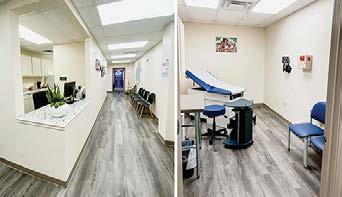
Architecture Plus worked closely with Prairie Grove School District to create a functional, secure plan. The new facility consists of 22 classrooms; music, art and career education spaces; a P.E. facility; student dining with a stage; and exterior dining, which can double as an outdoor classroom. All of the glazing is protected with security film.
For more information, visit archplusinc.net.
Strategos International, a safety/ security/workplace violence consulting and training firm, celebrated its 20th anniversary last June.
“Never did I dream in 2002, when we were exclusively training law enforcement and military professionals, we would be where we are today and serving so many clients globally in nearly every vertical market,” said Vaughn Baker, co-founder. “(Co-founder) Mark Warren and I give all the glory to God for how he has blessed us, guided us and provided for us and His company in this journey! We also could not have done this without the valuable contribution from all employees and contractors of Team Strategos!”
For more information, go to www. strategosintl.com or contact Steve Anderson at 501.617.4718.
That was one of the messages shared by four full-time school attorneys at the ASBA School Law Seminar Feb. 7.
Participants included Bryant’s Jeremy Lassiter, Cabot’s Layla Secrest, Springdale’s Kendra Clay, and Mary Claire Hyatt from Fayetteville. Cody Kees with the Bequette, Billingsley and Kees law firm moderated, while ASBA General Counsel Jay Bequette also participated.
Much of the discussion centered around the state’s wide-ranging Freedom of Information Act, which prohibits board members from discussing school business with each other, even informally, unless the media has been notified.
Lassiter advised erring on the side of caution. At Bryant, if more than one board member will be in the same place at a special event, the media is notified.
As he explained, “I have never been one as an attorney to advise getting anywhere close to that line on FOIA. … My reason for that is once you are determined to have been a school district or an administration that has violated FOIA, it’s going to be very hard for you to get that reputation back, number one, and then number two, you become a target. So, one person says you violate FOIA, you’re going to get pressed by other people as well, so it’s always good to just stay well away from that line, be as transparent as you can under the law, and then let somebody else get sued.”
Kees noted that state law requires all officially scheduled, special and called open meetings to be recorded. Does that include work sessions? Cabot only records the public board meeting, while Fayetteville this year began recording work sessions. Hyatt said all Fayetteville meetings are recorded.
The attorneys said board members’ emails and texts – even coming from their private phone – are a public record subject to FOIA if they relate to school business. Kees recommended avoiding creating those public records unnecessarily. Hyatt said attendees shouldn’t put anything in writing they wouldn’t want to appear in the newspaper.

The attorneys said they spend a lot of time on FOIA requests. Clay said the
last three weeks she had spent 95% of her time on one request from an opposing counsel who wanted a large number of documents that had to be heavily redacted. Hyatt said this year she had reviewed more than 40,000 pages.
Lassiter said over time he has changed his reaction to FOIA. He said the public has a right to know how its money is being spent. His focus has been on improving the district’s records retention policies and on training staff on the law’s requirements. That way, the district can respond effectively when it receives a request.
On a question about handling public comment periods, Hyatt said boards
that choose to have them should have clear boundaries regarding how long people can talk and how long the public comment periods will last. Guidelines should be read aloud before comments are made, and then they must be applied consistently. Clay said board members shouldn’t engage the public despite the natural inclination to correct misinformation. Lassiter said boards should plan beforehand how they will handle a meeting that becomes contentious, not react in the moment.
Kees closed the seminar by asking the attorneys to give advice to help districts avoid litigation. Secrest said they should do the right thing and also ask for help when needed. Clay likewise advised doing “what’s right for kids every time.” Hyatt advised trusting the school district staff. Lassiter said that, ultimately, a school board member will get sued if they stay in office long enough.
“The issue is being in the best possible position to win when you are sued, so I think that’s where the training comes in,” he said. “Go to the training. Don’t be afraid of being sued because when that lawsuit comes as it inevitably will, you’re going to be in the best position to defend against that.”
